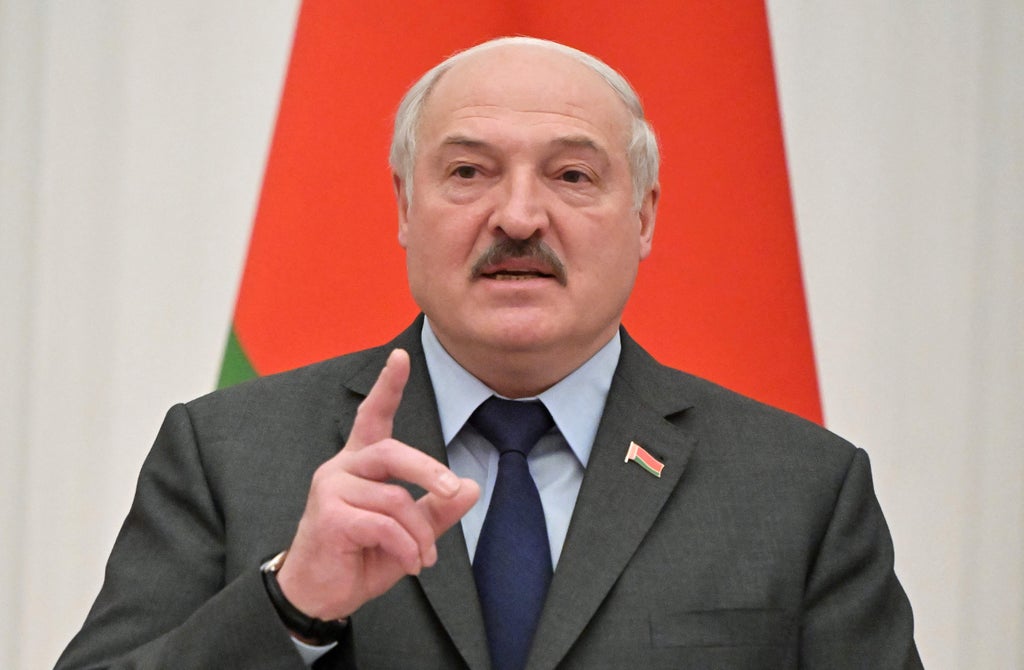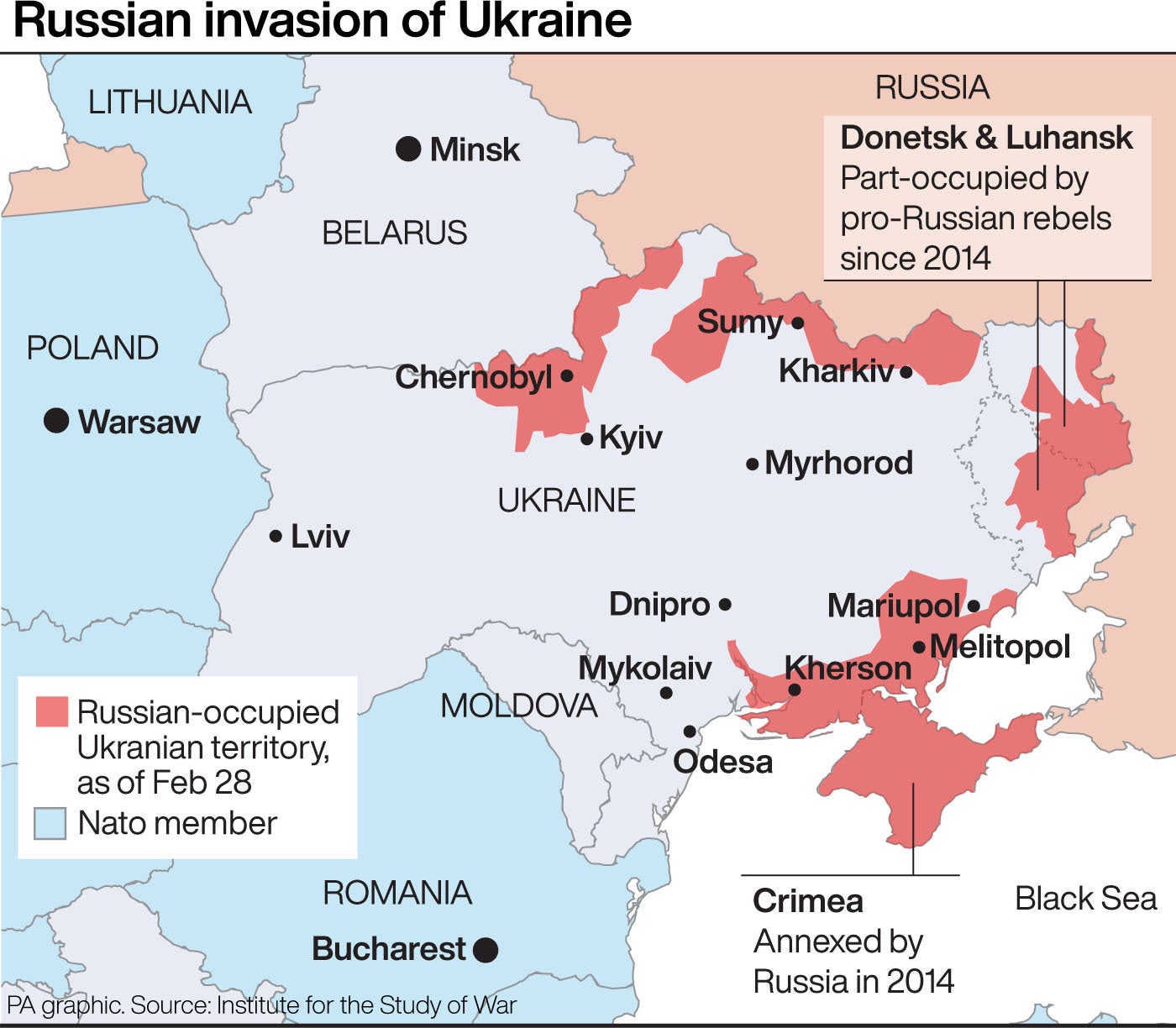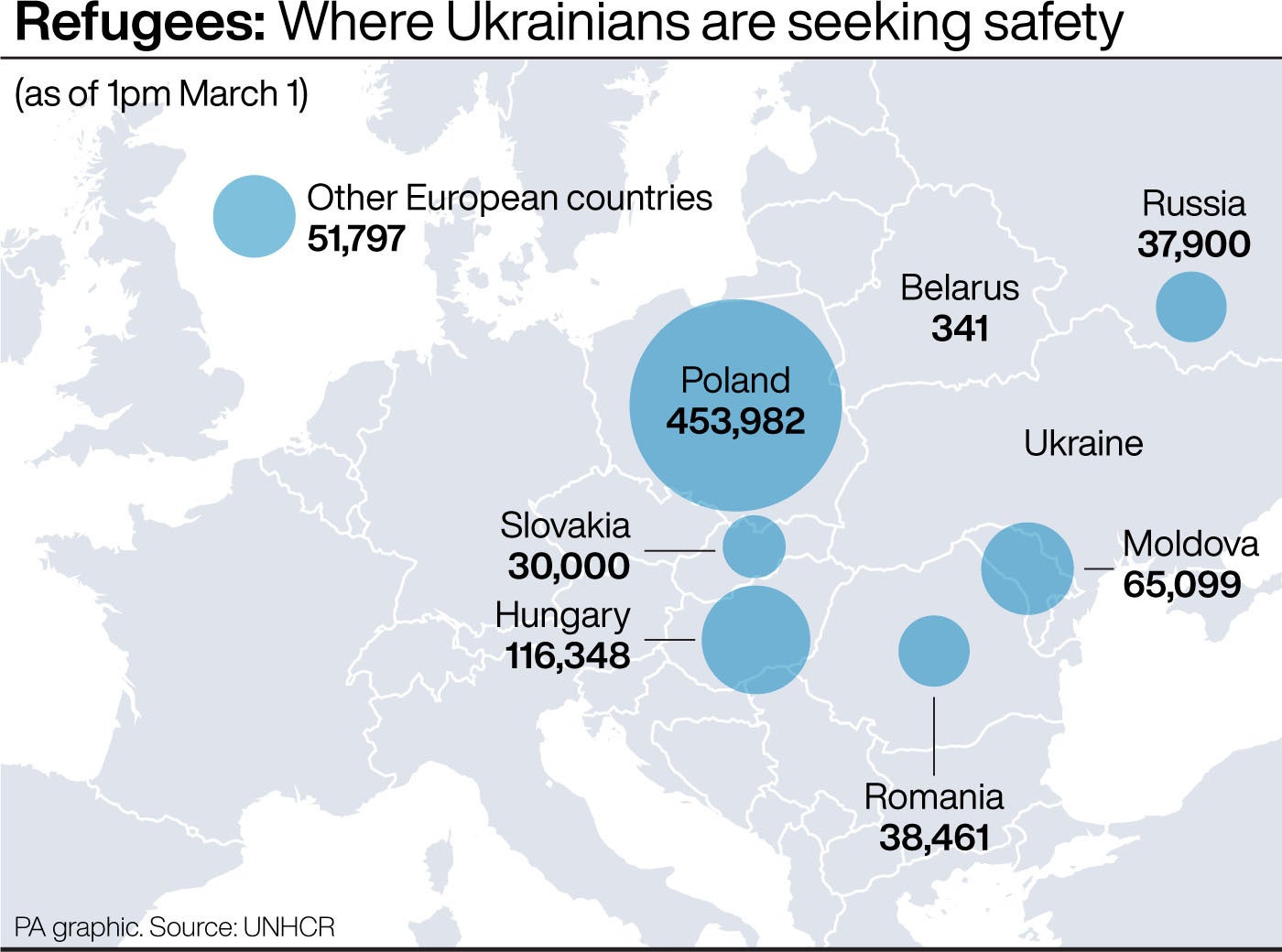
Belarus, the authoritarian state lying to the north of Ukraine, appears to be playing an increasingly prominent supporting role in Vladimir Putin’s invasion of Russia’s western neighbour.
Having already welcomed 30,000 Russian soldiers for military drills in the run-up to Mr Putin declaring war a week ago, Belarus’s president, Alexander Lukashenko, has since allowed the aggressor’s planes to take off from his country’s airports, changed the constitution to allow for the hosting of Russian strategic nuclear weapons and been accused by the Ukrainian parliament of moving forces into Chernihiv.
Mr Lukashenko denied that last allegation but did say that he would be deploying further troops to the border to “stop any provocation against Belarus”.
Baselessly accusing under-siege Ukraine and its supporters of engaging in “provocation” is a line-reading straight from Mr Putin’s script and follows Mr Lukashenko, increasingly a Kremlin sock puppet, blaming tough western sanctions for “pushing Russia into a Third World War”.
On Wednesday, the UN General Assembly passed a resolution signed by 141 member states condemning Russia’s war, with only five countries signalling their support: Russia itself, North Korea, Syria, Eritrea and Belarus. Fine company to be in.
Mr Lukashenko’s nation has already been sanctioned by the UK, US and EU, its athletes booted out of the upcoming Paralympic Games in China and the US State Department has shuttered its embassy in Minsk in opposition to Belarussian military collaboration with Moscow, which are close enough for the president to have inadvertently revealed a map displaying likely future Russian military operations, including one out of Odessa into Moldova.
Asked on Sunday about the possibility of Belarus becoming a Russian nuclear outpost for the first time since the collapse of the USSR in 1989, Mr Lukashenko warned the western allies off military intervention in Ukraine by declaring: “If you transfer nuclear weapons to Poland or Lithuania, to our borders, then I will turn to Putin to return the nuclear weapons that I gave away without any conditions.”
Countering, Ukrainian president Volodymyr Zelensky implored Mr Lukashenko to stay out of the conflict and for Belarus to stand up for itself.
“We are your neighbours,” he said. “Be Belarus, not Russia! You are making this choice right now.”
But for EU foreign affairs chief Josep Borrell, it is already too late.
“Minsk is now an extension of the Kremlin,” he said this week.
A huge reason for the close ties between Belarus and Russia is Mr Lukashenko himself, a Soviet throwback who rose through its ranks and was the only member of the Belarussan parliament to oppose the agreement that led to the formal dissolution of the USSR in December 1991.
He subsequently appealed to Boris Yeltsin and the Russian Duma for a new union of Slavic states at a time when the map of Europe was being drastically redrawn and other former satellite states held behind the Iron Curtain were celebrating their newfound independence and daring to imagine a brighter tomorrow.
Mr Lukashenko has ruled his country with an iron fist since 1994, routinely accused of vote rigging, cracking down on his political opponents and silencing the media, at least two of which are tactics straight out of the Vladimir Putin playbook.

In 1999, he began negotiations on a treaty outlining broad political cooperation with Moscow, taking the opportunity to generously extend his first term in office by two more years in order to realise it.
While Belarus’s kinship with Russia has occasionally been useful, as when Minsk was chosen as the venue for peace talks in September 2014 and February 2015 between Russia, Ukraine and the separatist rebel leaders of Donetsk and Luhansk, it has more often than not provided cause for concern.
Russia supported Mr Lukashenko when he faced the biggest challenge to his authority in 26 years in late summer 2020, which saw massive popular protests take place outside the Minsk Independence Palace and across the country and ended in a violent crackdown on demonstrators, mass arrests and the exile or imprisonment of his challengers.
His present lapdog loyalty could be payback for that timely reinforcement or an increasing sign of his country’s reliance on Russia in light of its economic frailty.
The Belarussian economy is saddled with unmanageable levels of public foreign debt at present, which may account for only 30 per cent of its gross domestic product but is almost entirely held in US dollars.
The sanctions it was already facing from the West in response to the events of 18 months ago have since prohibited Belarus from raising capital on international markets, meaning it was relying on loans from Russia to help pay off the £2.5bn it owes this year.
Moscow may not now be able to answer that appeal after its own economy was hammered by sanctions over the last week, forcing it to introduce capital controls and raise its interest rate as the public queued to withdraw cash from ATMs anticipating coming calamity.
As analyst Katia Glod points out in an editorial for Al Jazeera, Belarus does hold gold and foreign currency reserves of £6.4bn, which may provide short term support, but the ban on its export of potash fertiliser through Ukrainian and Lithuanian ports since 2020 continues to eat into its reserves, costing it as much as a £748m per year in revenue.
Other countries could now shun Belarus’s exports over its support for Mr Putin’s war, only increasing its reliance on Moscow’s patronage still further.

These circumstances increasingly force Mr Lukashenko’s nation into a position of subservience to the Kremlin, leaving it with little choice but to obey Mr Putin’s whims.
Should Belarus refuse and side with Mr Zelensky, it faces not only economic disaster but also the threat of retaliation by a Russian bear enraged.
Mr Putin has long resented the breakup of the Soviet Union and Nato “encroachment” into Eastern Europe and appears hell-bent on cancelling the independence of ex-satellites and restoring them to the embrace of the motherland.
Even if he fails to secure all-out victory over Ukraine, the Russian president may still annex the breakaway pro-Russian regions of Donetsk and Luhansk, whose claims to statehood he formally recognised as a prelude to and pretext for his present assault on the free democratic nation they remain part of.
Other nearby separatist regions could follow like South Ossetia and Abkhazia in Georgia, already the scene of Russian aggression in 2008, and perhaps Transnistria in Moldova.
Belarus could find itself next on that list.
The Independent has a proud history of campaigning for the rights of the most vulnerable, and we first ran our Refugees Welcome campaign during the war in Syria in 2015. Now, as we renew our campaign and launch this petition in the wake of the unfolding Ukrainian crisis, we are calling on the government to go further and faster to ensure help is delivered. To find out more about our Refugees Welcome campaign, click here. To sign the petition click here. If you would like to donate then please click here for our GoFundMe page.







